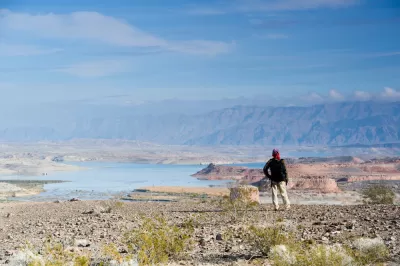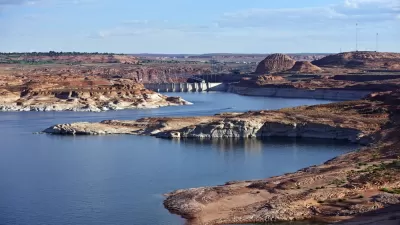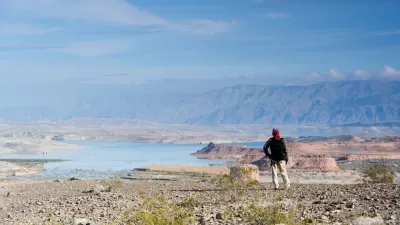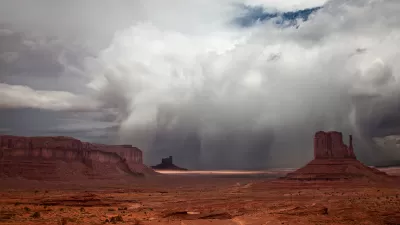The effects of climate change are already cutting deeply into the lifeblood of the U.S. West—the Colorado River.

Ian James reports on the state of the Colorado River after more than two decades of scientists have decided is a "megadrought." The water level of Lake Mead has fallen 130 feet since 2000, and the reservoir is at 39 percent of capacity. The reservoir will soon have less water than any time since the Hoover Dam started filling the lake in the 1930s.
"The latest projections from the federal government show the reservoir will soon fall more feet to cross the trigger point for a shortage in 2022, forcing the largest mandatory water cutbacks yet in Arizona, Nevada and Mexico," reports James The lack of rainfall throughout the West and a meager snowpack in the Rocky Mountains could cause even more severe shortages and water supply cuts the next year, too, according to James.
James has more frightening details to share:
While the Southwest has always cycled through wet and dry periods, some scientists suggest the word "drought" is no longer entirely adequate and that the Colorado River watershed is undergoing “aridification” driven by human-caused warming — a long-term trend of more intense dry spells that’s here for good and will complicate water management for generations to come.
The article also includes coverage of the ongoing efforts to manage the Colorado River as it changes due to climate change, including the Drought Contingency Plan (DCP), signed by seven states along the river in 2019. "Arizona and Nevada agreed to take the first cuts to help prop up Lake Mead, while California agreed to participate at lower shortage levels if the reservoir continues to drop," reports James. Arizona is in line for the largest cuts under the DCP.
The Biden administration also recently announced an interagency working group to support farmers, tribes, and other communities most impacted by water shortages.
Technology is also being deployed in the effort, reports James, including the use of artificial intelligence for scenario planning in the Colorado River Basin, led by Laura Condon, an assistant professor of hydrology and atmospheric sciences at the University of Arizona.
FULL STORY: As a hotter, drier climate grips the Colorado River, water risks grow across the Southwest

Alabama: Trump Terminates Settlements for Black Communities Harmed By Raw Sewage
Trump deemed the landmark civil rights agreement “illegal DEI and environmental justice policy.”

Study: Maui’s Plan to Convert Vacation Rentals to Long-Term Housing Could Cause Nearly $1 Billion Economic Loss
The plan would reduce visitor accommodation by 25% resulting in 1,900 jobs lost.

Planetizen Federal Action Tracker
A weekly monitor of how Trump’s orders and actions are impacting planners and planning in America.

Waymo Gets Permission to Map SF’s Market Street
If allowed to operate on the traffic-restricted street, Waymo’s autonomous taxis would have a leg up over ride-hailing competitors — and counter the city’s efforts to grow bike and pedestrian on the thoroughfare.

Parklet Symposium Highlights the Success of Shared Spaces
Parklets got a boost during the Covid-19 pandemic, when the concept was translated to outdoor dining programs that offered restaurants a lifeline during the shutdown.

Federal Homelessness Agency Places Entire Staff on Leave
The U.S. Interagency Council on Homelessness is the only federal agency dedicated to preventing and ending homelessness.
Urban Design for Planners 1: Software Tools
This six-course series explores essential urban design concepts using open source software and equips planners with the tools they need to participate fully in the urban design process.
Planning for Universal Design
Learn the tools for implementing Universal Design in planning regulations.
Caltrans
Smith Gee Studio
Institute for Housing and Urban Development Studies (IHS)
City of Grandview
Harvard GSD Executive Education
Toledo-Lucas County Plan Commissions
Salt Lake City
NYU Wagner Graduate School of Public Service





























